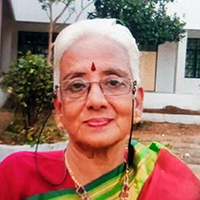
By Vasanthi Ranganathan, a member of the Rotary Club of Ambattur, India; Rotary Positive Peace Activator; member of The Rotary Foundation Cadre of Technical Advisers, and member of the India chapter of the Rotary Action Group for Peace.
As Rotary celebrates the intersection of literacy and peace this year, I am reminded of the importance of understanding both negative and positive peace. In today’s world, where there is so much information overload, media literacy is crucial. Teaching nonviolent communication as part of our literacy efforts helps foster new perspectives and build leadership skills centered on peace.
I have always found peace and conflict prevention an exciting and rewarding space. As a Rotarian, a Rotary Positive Peace Activator, and a member of the Cadre, I have been privileged to help motivate others to dream, discover their full potential, and make a lasting impact on the world.
My journey in empowering marginalized communities and fostering peace began at an early age with simple acts of empathy – listening and mingling with those different from me. As an 11-year-old, I remember visiting a mental health care hospital, as my school program, to entertain the residents, and later became involved as a volunteer in the field of mental health. These early experiences, combined with engaging in sports activities with children in government schools, children whose parents were in prison, and orphans, taught me that working with youth in their formative years on inner peace translates into peaceful actions and behaviors.
At age 16, I married for love, crossing caste boundaries in a society where such a union was unheard of. Born into the highest caste, convent-educated, English-speaking, I chose to marry a man who was different, everything society objected to – tall, dark, non-vegetarian, and a school dropout. Together, we had two beautiful children, and our life became a mission to address poverty, empowering individuals to discover their potential, dare to dream, and deserve to win.
My first major step beyond India was pursuing management education at the University of Connecticut in Hartford, USA, as a Rotary Ambassadorial Scholar at age 30. Leaving my two young children behind, I embarked on a journey that opened my eyes to the world’s misconceptions about India – caste, dowry and gender-related abuses were often the only things people knew. It was surprising to learn that many Americans weren’t aware that India granted women the right to vote alongside men, long before the U.S. or even Rotary allowed such inclusion.
I continued my studies at the East-West Center in Hawaii, pursuing a doctorate in counseling and guidance. Practicum and internships in American schools, particularly with military populations, enriched my understanding of peace and education. At Hawaii, I was given the Makana award in 1988 for my work.
I went back to India in 1991, working as an educational and management consultant. After visiting Malaysia for consultancy, I introduced the Abacus learning method as an after-school support center for children ages 3-14. This method employs kinesthetic, auditory, and visual elements to increase a student’s speed and accuracy. We turned local resources into ventures that promoted access to education while also creating business growth and community development.
My focus has always been on fragile, vulnerable communities – children whose parents are in prison, victims of war, the dependent elderly, and stay-at-home women assigned that role by their culture. While advocating for inclusion at higher levels, I’ve learned the importance of teaching these individuals to seek and demand their rightful place. Gender discrimination has been a part of my journey, but I’ve gained confidence and strength through my leadership experiences.
Over the years, I’ve learned key lessons essential to any peacebuilder: the importance of engaging a local culture and involving the community so they can take ownership of an effort and not just remain passive recipients. When we seek to build a legacy by helping others improve their situation, we create peaceful communities that can carry on creating change.
Becoming a Rotary Positive Peace Activator for the Asia cohort has been an incredible journey. It opened up new worlds of work, introduced me to extensive peace curricula and resources, and exposed me to countless training opportunities. Networking with my Asia cohort team and connecting with activators from other regional cohorts has broadened my own personal vision and strengthened my connections, helping me learn and replicate models.
As a member of the Cadre, I’ve had the privilege of auditing and consulting on numerous global grants. My role often includes emphasizing the importance of inclusion and the eight Pillars of Positive Peace. Workshops train teachers in self-esteem and inclusion. These enable peers to work together in peace and allow parents and the community to serve as stakeholders in the education process. Teaching youth skills like negotiation, arbitration, and mediation equips them for creating a better future for themselves and others, one that recognizes that investment and productivity only happen in peaceful communities.
Despite the challenges our world faces, I find motivation in the simple, constant rhythms of nature like the sunrise or the waves returning to the shore. These daily reminders encourage me to rise again, even after moments of despair. Education can transform lives, even if it’s just one child at a time, and there’s so much more we all can do.
Today, at 72, I choose to live happily, finding joy in the smiles and warm gestures of those whose lives I’ve touched. The journey continues, and I’m grateful for every step I’ve taken, and for all the steps ahead as I continue to follow my journey of purpose.
https://blog.rotary.org/2024/10/16/the-intersection-of-literacy-and-peace-transforming-lives-one-child-at-a-time/
